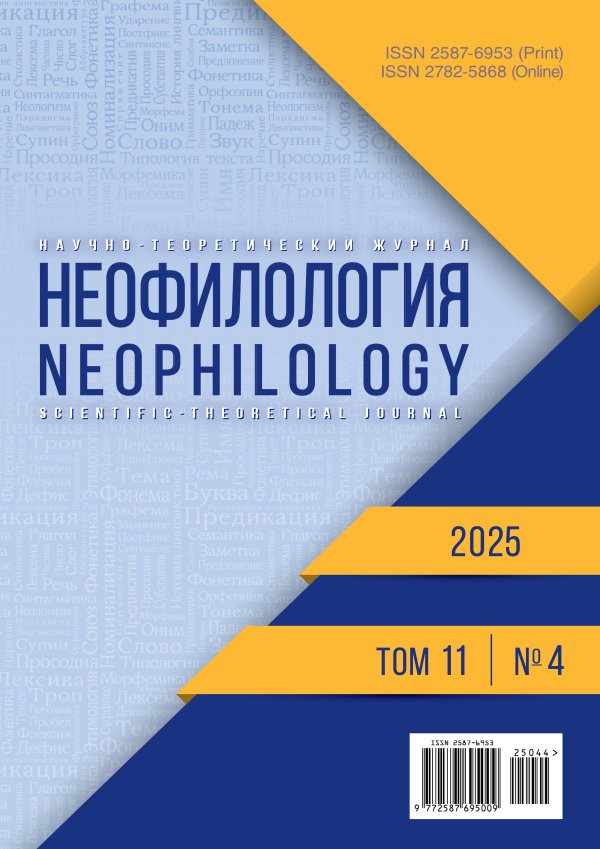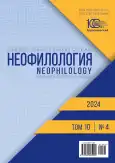В. Пелевин и Д. Кроненберг: точки пересечения отечественного и западного постмодернизма
- Авторы: Шерчалова Е.В.1, Тулушева Е.С.2
-
Учреждения:
- ОЧУ ВО «Московский университет им. А.С. Грибоедова»
- ФГАОУ ВО «Национальный исследовательский университет «Высшая школа экономики»
- Выпуск: Том 10, № 4 (2024)
- Страницы: 932-943
- Раздел: РУССКАЯ ЛИТЕРАТУРА И ЛИТЕРАТУРЫ НАРОДОВ РОССИЙСКОЙ ФЕДЕРАЦИИ
- URL: https://journal-vniispk.ru/2587-6953/article/view/295632
- DOI: https://doi.org/10.20310/2587-6953-2024-10-4-932-943
- ID: 295632
Цитировать
Полный текст
Аннотация
ВВЕДЕНИЕ. И Виктор Пелевин, и Дэвид Кроненберг – состоявшиеся мастера своего жанра. Как бы критически не отзывались рецензенты об их творчестве, канадский режиссёр пользуется титулом короля биологического хоррора, а отечественного постмодерниста неоднократно называли одним из самых популярных писателей современной русской литературы, и оба деятеля искусств уже давно обрели преданных почитателей. В 2015 г. Д. Кроненберг дебютировал с романом «Употреблено», что позволяет сопоставить художественные миры известных творцов в литературной плоскости. Несмотря на то, что, на первый взгляд, В. Пелевин и Д. Кроненберг не имеют ничего общего, детальное исследование обнажает художественные принципы, типичные для обоих писателей. Целью исследования выбран поиск сходств и общих идейно-эстетических решений, характерных для отечественного и западного постмодернизма.МАТЕРИАЛЫ И МЕТОДЫ. В качестве эмпирической базы привлечены большая проза В. Пелевина (выбраны произведения, опубликованные с 1996 по 2023 г.) и роман Д. Кроненберга «Употреблено». Были задействованы структурный, мотивный и компаративный методы анализа.РЕЗУЛЬТАТЫ ИССЛЕДОВАНИЯ. Сделан акцент на фабуляции и поэтике инобытия, а также на осмыслении капитализма как культурноэкономической основы современного мира и критики общества потребления как признаков постмодернизма. Отдельное внимание уделено изучению образа действующего героя, среди отличительных черт которого – соответствующие топографической организации текста мозаичность, фрагментарность и лиминальность.ЗАКЛЮЧЕНИЕ. Анализ отразил схожие художественные решения, в том числе мотивы и топографическую организацию в творчестве Пелевина и Кроненберга-писателя, позволяющие говорить о точках сближения и общности отечественного и западного современного литературного постмодернизма.
Об авторах
Е. В. Шерчалова
ОЧУ ВО «Московский университет им. А.С. Грибоедова»
Email: e.kabir777@gmail.com
ORCID iD: 0000-0002-7190-1151
кандидат филологических наук, доцент кафедры журналистики, коммуникаций и рекламы
105066, Российская Федерация, г. Москва, Новая Басманная ул., 35, стр. 1Е. С. Тулушева
ФГАОУ ВО «Национальный исследовательский университет «Высшая школа экономики»
Автор, ответственный за переписку.
Email: be-so-happy@yandex.ru
ORCID iD: 0000-0001-6374-4662
кандидат филологических наук, доцент факультета гуманитарных наук, докторант
101000, Российская Федерация, г. Москва, ул. Мясницкая, 20Список литературы
- Багдасарьян Н., Кравченко А. Цифровое общество и дискурсы постгуманизма // ЛОГОС. 2022. Т. 32. № 6 (151). С. 245-272. https://doi.org/10.22394/0869-5377-2022-6-245-271, https://elibrary.ru/uopula
- Ермаков Т.К., Дегтяренко К.А., Шпак А.А. Конструирование художественных метанарративов в современной культуре: формальные и смыслообразующие аспекты // Журнал Сибирского федерального университета. Серия: Гуманитарные науки. 2024. Т. 17. № 4. С. 681-693. https://elibrary.ru/lqplyw
- Бабошко Е.Ю., Галкин Д.В., Коновалов К.В. Концептуализация современности в контексте постмодернистской рефлексии // Вестник Томского государственного университета. Культурология и искусствоведение. 2023. № 49. С. 14-29. https://doi.org/10.17223/22220836/49/2, https://elibrary.ru/pemhwo
- Гуров О.Н. Технологии. Телесность. Будущее: Рефлексия Д. Кроненберга в кинофильме «Преступления будущего» // Вестник Ивановского государственного университета. Серия: Гуманитарные науки. 2024. №. 1. С. 28-39. https://doi.org/10.46726/H.2024.1.3, https://elibrary.ru/hogzht
- Борунов А.Б., Шерчалова Е.В. Авторский миф в современном постмодернистском романе // Филологический класс. 2021. Т. 26. № 3. С. 8-20. https://doi.org/10.51762/1FK-2021-26-03-01, https://elibrary.ru/fycgxg
- Заломкина Г.В. Фабуляция как способ осмысления мировой истории в романе В. Пелевина «Искусство лёгких касаний» // Гротовские чтения-2020: материалы Всерос. науч. конф. Самара, 2021. С. 395-405. https://elibrary.ru/ovvrfa
- Исаева М.В. Скомпрометированная образность в романе Брета Истона Эллиса «Американский психопат» // Визуальное во всем: сб. статей спецсеминара. М., 2021. Вып. 2. С. 93-96. https://elibrary.ru/rhglmt
- Кечик А. Образ капитализма и консюмеризма в творчестве Дэвида Кроненберга // Кино и капитал: альманах Центра исследований экономической культуры. Москва; Санкт-Петербург: Изд-во Института Гайдара, 2019. С. 182-195.
- Царёва Н.А. Процессы цифровизации в искусстве и творчестве: диалектика взаимосвязи // Проблемы музыкальной науки. 2024. № 1. С. 157-168. https://doi.org/10.56620/2782-3598.2024.1.157-168, https://elibrary.ru/tslyio
- Гудин Д.С. Топос кладбища в романах Е.Г. Водолазкина // Неофилология. 2022. Т. 8. № 1. С. 107-117. https://doi.org/10.20310/2587-6953-2022-8-1-107-117, https://elibrary.ru/cskltu
- Фоменко А.П. Утопия в поисках субъекта, субъект в поисках утопии // Вестник Томского государственного университета. 2022. № 478. С. 58-63. https://doi.org/10.17223/15617793/478/7, https://elibrary.ru/xypcru
- Сильчева А.Г., Шерчалова Е.В. Мифологический топос в романах В. Пелевина // Филологические науки. Вопросы теории и практики. 2022. Т. 15. № 10. С. 3174-3178. https://doi.org/10.30853/phil20220511, https://elibrary.ru/hqnfph
- Чжан Ч. Мотив утраты «Я» в романе Виктора Пелевина «Generation ‘П’» // Гуманитарный вектор. 2021. Т. 16. № 1. С. 74-82. https://doi.org/10.21209/1996-7853-2021-16-1-74-82, https://elibrary.ru/lqugrq
- Филатов А.В. Поэтика русской литературы. Поэтика инфернального пространства в поэзии О.Э. Мандельштама: философский аспект // Русская словесность. 2021. № 1. С. 82-92. https://elibrary.ru/kvkcck
Дополнительные файлы










